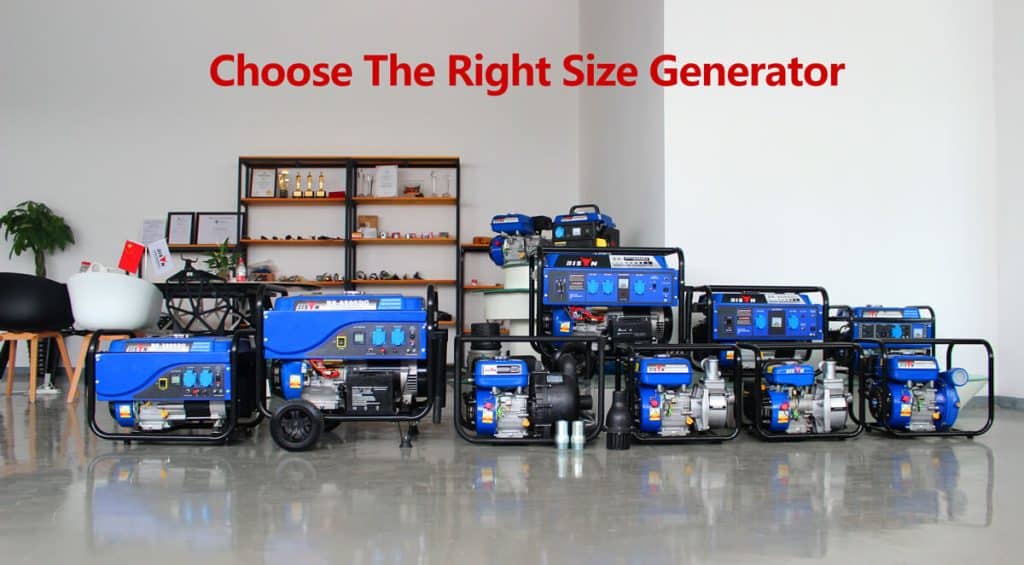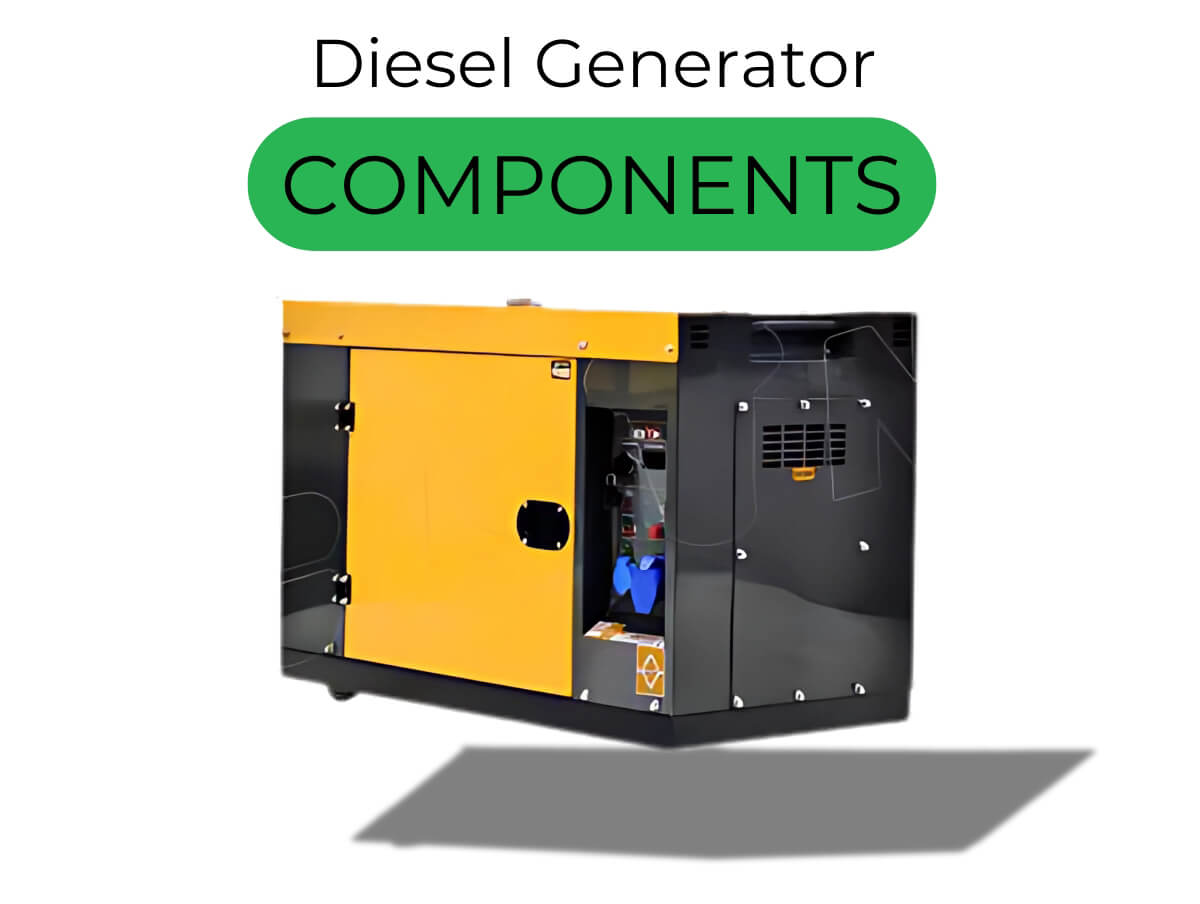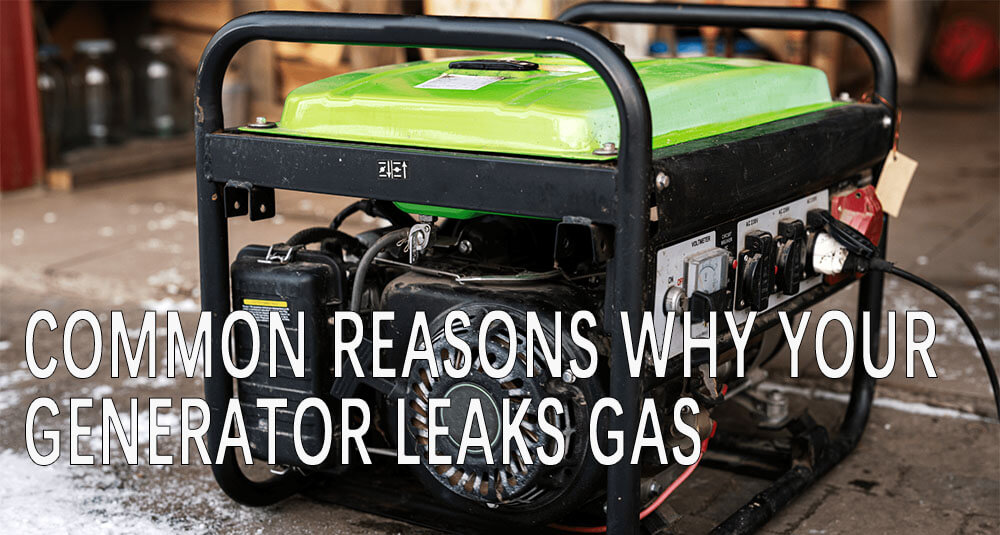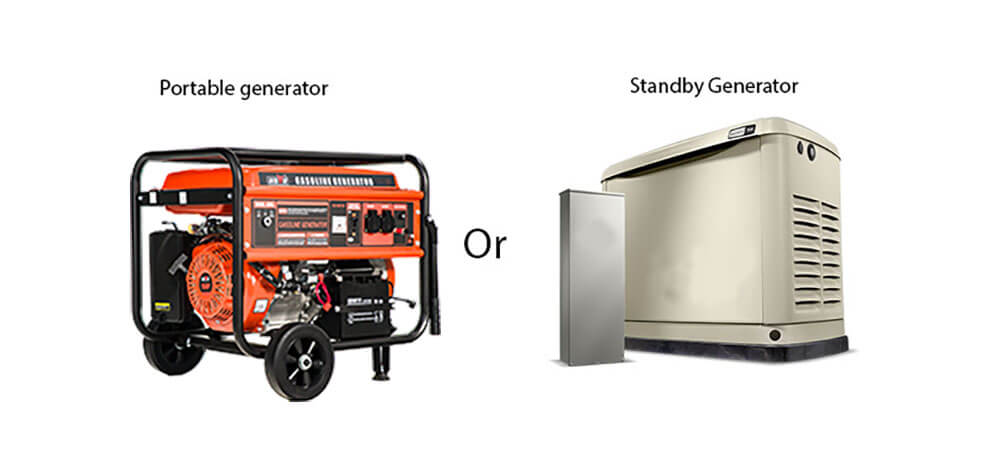Choose the right size generator
- By BISON
Table of Contents

In today’s energy-constrained world, a power outage can give us a very difficult winter if a snowstorm hits. Having a generator on hand to power spaces and equipment in the event of a power outage or in areas without standard electrical service would be a wise choice. With a wide range of generators on the market, ranging from 800 watts to over 500,000 watts, there are different types of generators to suit every need. Bison, as a professional generator manufacturer, offers a guide on how to choose the right generator for you. This guide will help you choose the best size generator for your needs.
Total Required Wattage
Many people ask us “what size generator do I need?” The answer to this question depends on what it will be used for. All our models are rated to run at a certain wattage, so you must consider the amount of wattage you need your generator to produce. Regardless of whether you’ll be running camping equipment or a whole construction site, this is a vital step in the buying process – otherwise you might end up with a generator that isn’t fit for purpose.
Here are four key things to consider when it comes to wattage:
- You can find the individual wattages of an item on the equipment itself, in the user manual, on a manufacturer’s website, or by contacting the manufacturer by phone.
- What items do you want to run together? For example, if you want to run a slow cooker and a fan at the same time, you need the combined wattage of the equipment. If you’ll only ever run each item independently, then you just need to worry about the item with the highest wattage.
- Do the items have a starting wattage? Any piece of equipment with an induction motor will have a starting wattage, and therefore a higher wattage requirement. This includes chop saws, air compressors, vacuum cleaners, pressure washers, and freezers – anything with a motor in it. Simply multiply the item’s wattage by three to find its starting wattage.
- Give yourself some headroom. Just because your car can go 120 miles an hour, doesn’t mean that it’s suitable to drive at the maximum all the time. Your generator will be very much the same; a 4200W generator shouldn’t be used to power 4200 watts worth of equipment. Give yourself at least 20% head room.
common household wattages
To determine the best generator for your home, refer to the list of common household wattages below and select which appliances and systems you want to power. If you want to know the exact wattage, consult your appliance and system manuals.
Below is a list of approximate operating wattages for various home appliances and technologies
- Refrigerator/freezer. 600 – 800
- Electric stove (one element). 2500
- Toaster. 1100 – 1700
- Microwave oven: 1200
- Electric hot plate: 1250
- Coffee maker: 400 – 800
- Electric oven: 5000
- TV set: 100 – 350
- Personal computer: 500 – 2000
- Hair dryer: 1200 – 1500
- Vacuum cleaner: 700 – 1400
- Space heater: 1250
- Table Lamp: 150
Below is a general list of HVAC and system wattage requirements.
- Electric Furnace: 5000 – 25000
- Heater (radiant): 1300
- Central air conditioning: 2000 – 4000
- Water heater. 3000 – 4500
- Water Pump: 1000 – 2000
- Window air conditioning: 600 – 1500
- Outdoor lighting. 500 – 1000
- Sump pumps: 1500
Note: The wattage in this guide defaults to generic wattage and should not be used to calculate specific requirements. Please refer to the owner’s manual that came with your appliances and tools for manufacturer supplied power requirements.
work out final wattage
List the items you want to power and the wattage they require. Add these numbers together to figure out what size generator will work for you. The more appliances you want to use, the larger the generator you will need.
Rated, or running wattage, is the amount of electricity necessary to run your appliances continually. Surge or starting wattage, is the additional amount of electricity needed for 2-3 seconds to start electric motors commonly found in household appliances (such as a furnace fan or refrigerator). Since appliances rarely start-up at the same time, you will only need to factor in the appliance with the highest additional surge watts.
So, what capacity generator do I need, exactly? Here’s how to work out what your final required wattage is:
All the individual equipment wattages for the items you wish to run together (x 3 if the item has an induction motor), + 20% head room = minimum wattage generator you require.
For example, to run a 250W slow cooker with a 650W hand drill the maths is:650W (drill) x 3 (starting wattage) = 1950W1950W (drill total) + 250W (slow cooker) = 2200W2200W + 20% = 2640W total required watts requiredGenerators are often listed in kVA (kilo-volt-amps) or kW (kilowatts). These are both measurements of power, just in slightly different formats.
- To convert Watts (W) to KiloWatts (kW) divide by 1000 – Eg. 1000W = 1kW
- To convert KiloWatts (kW) to Kilo-volt-amps (kVA) divide by 0.8 – Eg. 1000W = 1kW = 1.25kVA
With a little math and a look at what you need to keep your life running, you can easily answer the question, “How big of a generator do I need?” The best thing to do is make sure you have an answer before an emergency requires it.
Questions about Choose the right size generator
Do You Need A Generator Set For Home Use Or Professional Use?
To make it easier for you to work out which generator to buy, we’ve split our range into two categories: generators for domestic use and generators for professional use. Each comes with its own warranty specific to its intended purpose.
If you’re searching for a high-quality diesel or petrol generator for home use, then an BISON generator will be ideal. Designed to be run occasionally, they are perfect for doing household jobs requiring power tools, as a short back-up generator for outages, or for working in the garden. Each of our BISON domestic generators are fantastic value for money and perfect for home and hobbyist use.
If you’re planning to use the generator every day or commercially, we have a wide range of exceptional models that are up to the task. Renowned as some of the best generators made in the UK, each is designed to the highest of standards with energy efficiency and performance in mind.
Do You Need A Generator For Sensitive Electronics?
If you need to power anything with a microprocessor, you’ll need to buy a generator for sensitive electronics. This is because these types of equipment are considered sensitive to electrical power and shouldn’t be run directly from a conventional generator. For instance, items such as computers, phones, TVs, games consoles, printers, DVD players and even some kitchen appliances and power tools will require a generator for sensitive electronics. One simple solution is to run them from an inverter generator to prevent damaging them. These generators “invert” DC power back into AC power, resulting in a much “cleaner” power (pure sine waves).
Diesel VS Gasoline Generator : Which Is Right For You?
If you’re looking at both petrol and diesel models, you may be wondering which generator to buy in line with your needs. We know that choosing between a diesel or petrol generator for home use or work may seem arbitrary, but in reality there are key differences that you need to know, so you can work out which will be best for you.
Firstly, you need to think about the upfront and long-term costs of each option, as they vary significantly. Diesel generators tend to cost more out of the box than petrol alternatives. However, over the long term, diesel will give you a considerable saving on fuel, especially if you have access to red diesel. Plus, diesel generators will generally stand up to regular use.
As a rule of thumb, it you’re looking for a generator under 10 kva then you would purchase a petrol model. Over 10 kva you would look at diesel generators.
Most Popular Posts
QUESTIONS?
CONTACT US TODAY.
buy?
Related Posts

diesel generator components
BISON will explore the key components of diesel generators and understand how each part contributes to their overall performance and reliability.

Common reasons why your generator leaks gasoline
In this guide, BISON covers common causes of gasoline leaks, warning signs to watch for, and how to fix the issue.

portable or standby generators: which one fits your needs?
This article by BISON breaks down the differences between portable and standby generators. By the end, you’ll find which one fits your needs best.
.png)
-qbpqbzxxvtguiuwezisu6wo6j1i29b4m1el1ir1u8o.png)

